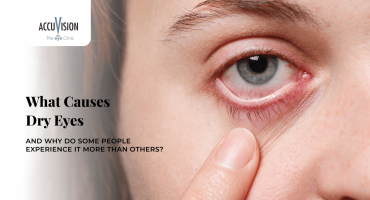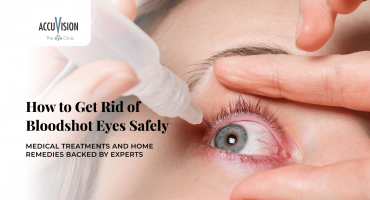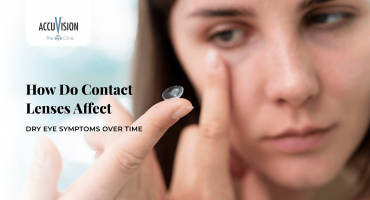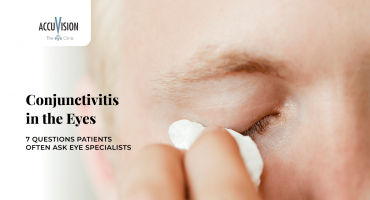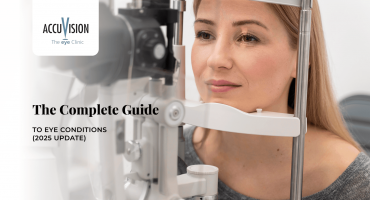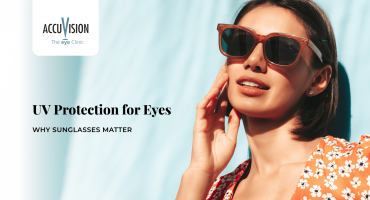- What is Myopia?
- Causes of Myopia
- Symptoms of Myopia
- Myopia Diagnosis and When to See an Eye Doctor
- Treatment Options for Short Sightedness
- Prevention of Nearsightedness
- Why Choose AccuVision for Myopia Treatment?
Myopia, or short sightedness, is one of the most common vision conditions in the world, affecting people of all ages. If you’ve ever found yourself squinting to read road signs or struggling to see objects at a distance, you’re not alone as nearsightedness is increasingly common, especially in younger populations.
This comprehensive guide explores everything you need to know about myopia, from its causes and symptoms to the latest nearsightedness treatment options available, including laser eye surgery for short sightedness.
What is Myopia?
Also known as nearsightedness, it is a common refractive error where distant objects appear blurry, while close-up tasks like reading or using a phone remain clear.
This happens when the eyeball is too long or the cornea too curved, causing light to focus in front of the retina instead of directly on it.
Causes of Myopia
1. Genetic Factors
One of the strongest risk factors for short sightedness is genetics. If one or both parents are myopic, there’s a higher likelihood their children will develop nearsighted vision too.
2. Environmental & Lifestyle Factors
- Prolonged near work: Excessive screen time, reading, or studying at close distances may contribute to the onset and progression of nearsightedness.
- Lack of outdoor activity: Research shows children who spend less time outdoors are more likely to develop myopia.
- Inadequate lighting: Poor lighting during reading or digital use can contribute to eye strain and visual fatigue.
3. Eye Structure Abnormalities
Structural differences in the shape of the eye, such as a longer axial length, can increase the risk of nearsightedness, particularly during childhood or adolescence.
Symptoms of Myopia
Recognising the symptoms early can prevent complications and support timely treatment. Common signs of short sightedness include:
- Blurry distance vision (for example: trouble seeing signs while driving)
- Squinting to see faraway objects
- Headaches due to eye strain
- Difficulty seeing in low light
- Eye fatigue after prolonged screen or near work
- Holding books or devices very close to the face
Myopia Diagnosis and When to See an Eye Doctor
A thorough eye examination is the only way to accurately diagnose myopia. Your Optometrist or Ophthalmologist will use several tests, including:
- Visual acuity test
- Retinoscopy
- Refraction assessment
- Corneal topography (to evaluate corneal shape)
Even if your vision seems fine, regular eye exams are crucial, especially for children or those with a family history of nearsighted vision.
Book a free screening consultation today and speak with one of AccuVision’s experienced Optometrists
Treatment Options for Short Sightedness
There are multiple nearsightedness treatment options available, depending on your age, eye health, and lifestyle.
1. Glasses and Contact Lenses
Glasses and contact lenses are the most commonly prescribed options for correcting myopia. Today, however, they are increasingly customised as part of myopia control strategies, especially for children and teens. Specialised lenses may help reduce the progression of myopia. Organisations like the World Council of Optometry and the Association of Optometrists (AOP) offer valuable guidance on evidence-based myopia control approaches.
2. Orthokeratology (Ortho-K)
Ortho-K involves wearing specially designed rigid gas-permeable lenses overnight to temporarily reshape the cornea. This provides clear vision during the day without glasses, though the effect is reversible and needs nightly wear.
3. Laser Eye Surgery for Short Sightedness
Laser eye surgery treatments offer a longer-lasting correction, helping millions reduce or eliminate their reliance on glasses or contact lenses for short sightedness.
- LASIK Eye Surgery for Nearsightedness: Involves creating a flap in the cornea and reshaping the underlying tissue to correct refractive error. It’s quick, safe, and highly effective for most patients.
- PRK (Photorefractive Keratectomy): Suitable for patients with thinner corneas, this surface-based technique reshapes the cornea without creating a flap.
- Lenticule Extraction: Minimally invasive procedures like SMILE® (Small Incision Lenticule Extraction) and SILK™ are ideal for active individuals or those with specific corneal characteristics.
These advanced techniques involve removing a precise lenticule (a disc of corneal tissue) to reshape the eye, offering faster recovery, greater comfort, and excellent visual outcomes.
These laser eye surgery for short sightedness options are tailored based on your individual eye profile, lifestyle, and vision goals.
At AccuVision, we specialised in minimally invasive, customised surface laser treatments that offer increased safety profiles while delivering excellent visual outcomes.
Prevention of Nearsightedness
Myopia Control in Children
Myopia often begins in childhood and may progress quickly. Early intervention is essential not only to correct vision but to help slow progression. Today, Optometrists follow a global standard of care for managing childhood myopia, incorporating lifestyle advice, monitoring, and targeted treatments. Parents can explore educational guidance from organisations such as the World Council of Optometry, which promotes evidence-based approaches for managing short sightedness in young patients.
While not all cases of myopia can be prevented, especially when genetics are involved, certain habits may help slow its progression:
- Encourage children to spend time outdoors daily
- Follow the 20-20-20 rule: Every 20 minutes, look at something 20 feet away for 20 seconds
- Limit screen time and promote breaks during close-up tasks
- Ensure proper lighting during reading or device use
- Get regular eye exams, particularly for children or teens
Complications of Untreated Myopia
Untreated or unmanaged myopia or nearsighted vision may lead to increased risk of:
- Retinal detachment
- Myopic macular degeneration
- Cataracts at an earlier age
- Glaucoma
These complications are not limited to high myopia. Recent clinical studies indicate that even moderate levels of myopia can carry similar risks, making early diagnosis and proactive treatment essential.
Why Choose AccuVision for Myopia Treatment?
At AccuVision, we combine cutting-edge diagnostic technology with customised treatment plans to deliver safe and effective solutions for short sightedness. Here’s what makes us different:
- Advanced laser platforms for tailored corrections
- Experts in complex cases including high nearsightedness
- Minimally invasive, customised surface treatments with increased safety profiles
- Trusted by thousands with a 99%+ patient satisfaction rate
- Ethical, honest advice with no pressure
From diagnosis to treatment, our focus is on helping you see your best, safely and confidently.
Conclusion
Myopia, or short sightedness, doesn’t have to limit your life. Whether you’re exploring glasses, contact lenses, or laser eye surgery for short sightedness, the first step is a thorough consultation to understand your unique needs.
With the right treatment, clear, independent vision is possible, and AccuVision is here to guide you every step of the way.
Book your free screening consultation today and take the first step towards clearer vision.
Schedule your consultation now!
Frequently asked questions:
What conditions are caused by myopia?
High myopia increases the risk of serious conditions like retinal detachment, glaucoma, cataracts, and macular degeneration if left untreated or unmanaged.
Do screens cause nearsightedness?
Excessive screen time doesn’t directly cause nearsightedness, but prolonged near work can contribute to eye strain and may accelerate myopia progression in children.
Can myopia cause headaches or eye strain?
Yes, uncorrected or progressing myopia can lead to headaches, eye fatigue, and discomfort, especially during tasks requiring distance focus or prolonged concentration.
Can myopia be corrected with glasses or contact lenses?
Yes, glasses and contact lenses effectively correct nearsighted vision, though they don’t prevent progression nor reduce long-term dependency like laser eye surgery.
How does AccuVision determine the best treatment for myopia?
AccuVision performs detailed diagnostics to assess corneal shape, prescription, lifestyle, and eye health, ensuring a personalised treatment plan that delivers long-term clarity and comfort.



